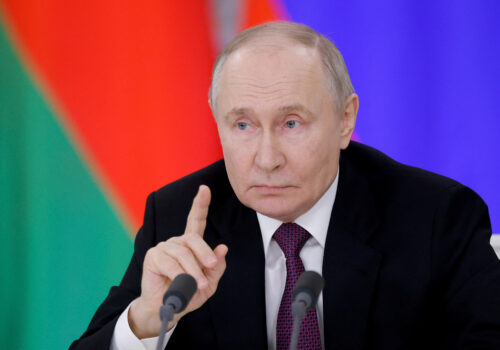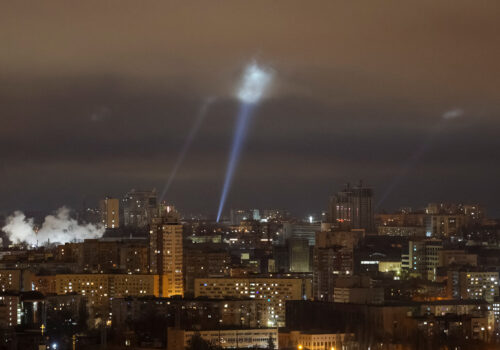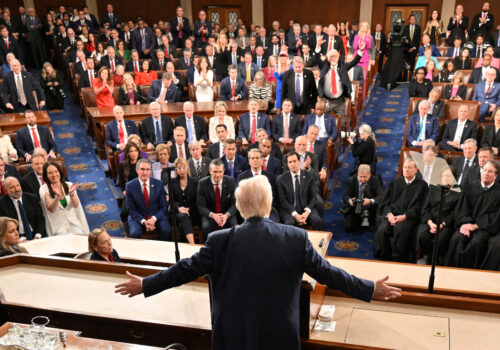A light in the darkness: Why RFE/RL matters now more than ever
It was in the middle of a bitterly cold night in 2014 when my phone rang. At first, I ignored it. Then came a second call, and a third. The persistent buzzing was enough to jolt me awake. When I finally answered, a distressed female voice met me on the other end.
“They’re kicking me out of my home. I have two kids. Nowhere to go. I live in Mikrorayon,” she said, her voice breaking under desperation. She was referring to one of countless Cold War–era housing blocks built by successive regimes across the Soviet nations. Behind her, frantic voices clashed.
I knew that sound well. It was the sound of fear.
This was not unusual. As the director of Radio Free Europe/Radio Liberty’s (RFE/RL) Turkmen Service, locally known as Azatlyk, I often received such calls—cries for help in a country where independent journalism is considered a threat.
Turkmenistan, like many of the authoritarian regimes RFE/RL has covered, was built on the iron grip of a single ruler. Dissent was crushed, voices silenced, and truth distorted. RFE/RL was for many the only major source of news free from government manipulation.
The woman on the phone, whom I will call Maya, was a young widow with two children, the youngest just six months old. That night, city officials had come to demolish her home under the national leader’s so-called “beautification” campaign in the capital city Ashgabat.
When she saw the municipal workers approaching her home, she slammed the door shut, pressed her back against it, and, in that moment of desperation, reached for the only thing she believed could bring hope and protection: RFE/RL.
After gathering details, we did the only thing we could: We made a call to the local municipality. It was a simple act of journalism. We asked why a young widow with children was being thrown onto the streets in freezing temperatures.
That call was enough. The officials withdrew—not out of mercy, but out of fear. It was fear that the leader of the nation might catch wind of the story—that, as in many similar cases, he might view it as a stain on his image and make those responsible pay the price.
This is the power of RFE/RL. It is not just a news organization, but a shield for those whose own governments have abandoned them. In Turkmenistan, as in many of the places the organization serves, there are no fair and impartial courts to turn to, no free press to expose wrongdoing, no way for many citizens to hold power accountable. Without RFE/RL, Maya’s story would never have been heard. And she would have been just another forgotten casualty of authoritarian rule.
In recent days, however, the Trump administration has raised the specter of a world without RFE/RL. On March 15, the US Agency for Global Media terminated the funding grant for RFE/RL, endangering the organization’s ability to provide journalism for millions of people who would struggle otherwise to get access to news that is not controlled by an authoritarian government.
What’s the price of truth?
The recent decision to cut funding for RFE/RL along with its sister networks—Voice of America, Radio Free Asia, the Middle East Broadcasting Networks, and the Office of Cuba Broadcasting—is not just a financial cutback. It is a major blow to the millions who rely on it.
For decades, these networks have signaled that the United States has not turned its back on those living under the rule of autocrats and radical extremists. They have served as a voice for the silenced, a bridge connecting the oppressed to the world beyond their borders.
RFE/RL’s annual budget was $142 million in fiscal year 2024. That is slightly less than the cost of three Apache helicopters, the same type of aircraft that was lost in large numbers over two decades of war against the Taliban in Afghanistan, with little lasting progress to show for it.
With that single investment, RFE/RL reaches nearly 47 million people each week, broadcasting in twenty-seven local languages across regions spanning from Russia to the Balkans, from Iran to Central Asia, and all the countries in between.
In the tribal regions of Pakistan, where the Taliban’s grip remains strong, the alternative to RFE/RL’s Pashto-language Mashaal Radio is what locals call “Mullah Radio”—an extremist-run broadcast spewing radical propaganda.
After Russia launched its full-scale invasion of Ukraine, RFE/RL’s Ukrainian Service exposed war crimes while Russian state media flooded the airwaves with propaganda. Now, as Russia tightens its grip on Central Asia and China expands its influence in the region, RFE/RL remains an important line of defense against a rising tide of disinformation.
Hope, even in darkness
When I first joined RFE/RL in 2003, it had already been the lifeline for millions behind the Iron Curtain for over half a century. I remember when former Czech President Václav Havel visited RFE/RL headquarters. He spoke of growing up under communism, of listening to RFE/RL in secret, and of how those broadcasts carried the hope that one day freedom would come.
Havel wasn’t alone. Generations of dissidents, reformers, and ordinary citizens across Eastern Europe and Central Asia have similar stories. They drew strength from the words they heard in the media outlet’s broadcasts.. And when the Iron Curtain finally fell, they didn’t just see journalists at RFE/RL—they saw the voices that had never abandoned them.
Now, if the voice of RFE/RL and its sister networks is silenced, then what will fill the void? Chinese state media? Russian disinformation? The Taliban’s “Mullah Radio?” These forces have long pursued this outcome—weaponizing intimidation, censorship, harassment, and violence. Yet so far they have failed. The leaders of Iran, China, Russia, and Belarus are likely cheering the position in which these channels now find themselves. With no counterbalance, the propaganda of these regimes could go unchecked.
This outcome also would contradict the Trump administration’s own stated commitment to free speech, depriving millions of access to independent journalism. In many of its broadcast regions, RFE/RL remains one of the last sources, if not the only source, of truth.
History has shown that when free media disappears, oppression often takes its place.
For Maya, and for the millions like her, RFE/RL must endure.
Muhammad Tahir is a nonresident senior fellow at the Atlantic Council’s Eurasia Center and a former RFE/RL executive who dedicated eighteen years to advancing independent journalism and press freedom in some of the world’s most restrictive environments.
Further reading
Thu, Mar 13, 2025
Vladimir Putin does not want peace. He wants to subjugate Ukraine.
UkraineAlert By
Russian President Vladimir Putin's evasive response to US President Donald Trump's ceasefire proposal underlines his commitment to continue with an invasion that aims to extinguish Ukraine as a state and nation, writes Mykola Bielieskov.
Tue, Mar 18, 2025
The real meaning of Putin’s 30-day ‘energy cease-fire’ in Ukraine
Fast Thinking By
Our experts analyze the proposed limited cease-fire that would temporarily halt attacks on energy infrastructure between Russia and Ukraine.
Wed, Mar 5, 2025
Experts react: What Trump’s address to Congress means for the world
New Atlanticist By
In his address to Congress, the “America first” president mapped out his administration’s high points and hopes from Greenland and Ukraine to Taiwan, Panama, and Mexico.
Image: A flag and a sign of Radio Free Europe/Radio Liberty are shown at its headquarters in Prague, Czech Republic, March 17, 2025. REUTERS/David W Cerny


